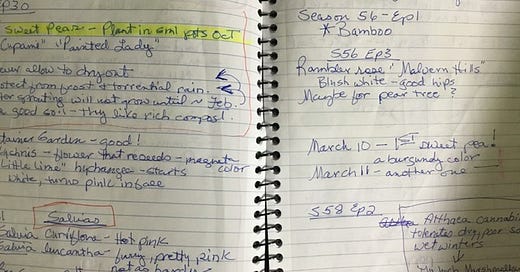Recently I realized I’ve begun marking the passing of time through words and growing things. When I wake up in the morning, that day of the week begins with my thinking about what I will be reading, writing, or editing. I have a schedule I follow because I like order (or routine) in my life and I have other people depending on me. And yet, the “order” the hours take are not strict and unbending. Sometimes, I’ll wait to edit an essay 3 or 4 days before it’s due to publish, thereby spending several hours doing that one thing, or I’ll begin writing down a story a week before the submission deadline. Sometimes, often actually, the urgency lights a fire under my ass, makes me accountable.
I keep a journal, of sorts, that includes gardening notes - when I planted seeds or bought a plant, what seeds took and what didn’t, dates of first blooms, dates I fed or cut something back, all sorts of notes. I can look back for several years and see what grew well and what bombed. Although I keep great notes, the garden itself is wild and somewhat overgrown. Plants that shouldn’t be together end up in the same pots or seeds get planted past the “plant by” dates because I don’t always follow traditional gardening advice. Freedom. I want to see what will happen and, more often than not, everything gets along just fine as long as I tend to watering and feeding. Accountability.
There is order, accountability, and freedom in my approach to writing. Order doesn’t have to be limiting at all when you mold it into what works for you. Something I’ve realized recently is that I’ve been fighting against the “write every day” blueprint because I thought that meant you sit down at a desk every day at a certain time and write at least 1000 words, no matter what. Google “write every day” and you’ll get a plethora of advice, workshops, and classes and yet, I believe you will be happier and more prolific when you design a practice that works for you as an individual.
I often will “think” a story before I begin writing it down. Sometimes it starts in the middle with the beginning coming later, sometimes it starts with a sentence when I’ll think, yes - this is the beginning. I might jot down sentences or phrases out of context - because I don’t know the context yet, the order of the piece is in flux. When I’ve got a fairly concrete outline or gaggle of scenarios going in my head, I’ll begin writing it down. So, yeah, I might go for days, even weeks, “writing” in my head or jotting notes on paper bits before physically writing on the computer. That is when the piece’s order, or storyline, reveals itself. I say “reveals itself” because often the piece ends up in a very different place than I imagined.
I allow myself the freedom to define what constitutes writing for me. Even my gardening notes count toward writing, in my opinion. Reading counts toward writing - I’ve gotten inspiration for a piece while reading another’s work. (Not plagiarism, just ideas.) Observing your surroundings and listening to others counts toward writing because this is the groundwork of the writer. “Writing” does not have to mean numerous paragraphs on paper or computer every day to count. You do you, do what works for you. Breaking out of the confines of what is expected, what is taught, gives you all the freedom you need to write.
I used to think freedom meant doing whatever you want. It means knowing who you are, what you are supposed to be doing on this earth, and then simply doing it.
― Natalie Goldberg, Writing Down the Bones: Freeing the Writer Within





Yes to all of this. A writing coach told me long ago that thinking was an important part of writing. And reading, and living. Thank you for sharing your process. Thinking now I need a garden notebook!